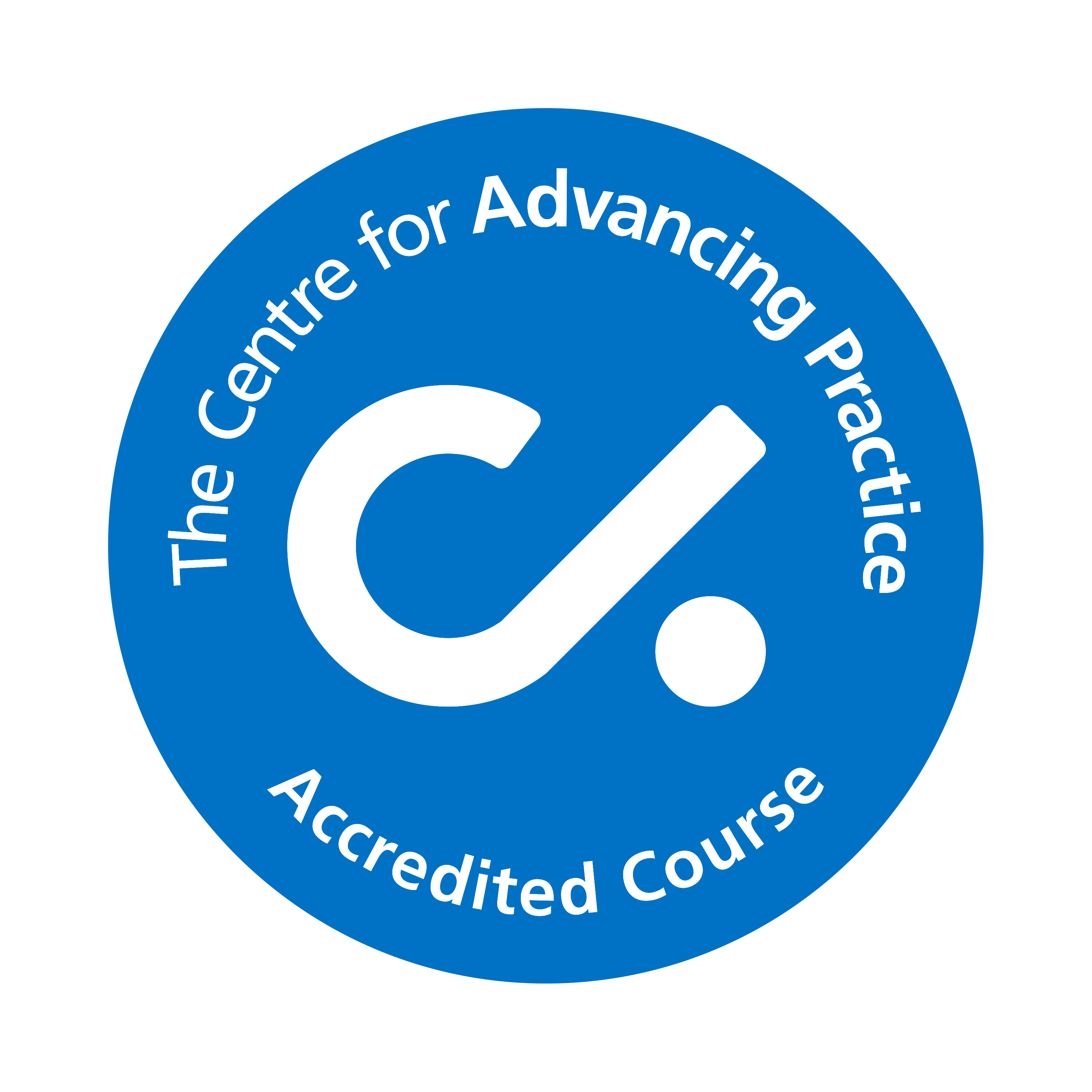Advanced Clinical Practice, MSc
Learn essential strategies and prepare for leadership roles in advanced clinical practice with this engaging Master’s in Advanced Clinical Practice.
Develop your skills and deepen your knowledge of advanced health clinical practice with this tailored Master's course. Our MSc in Advanced Clinical Practice is designed for current practitioners who are registered with a professional body and who would like to become advanced clinical practitioners.
Your studies are based around four pillars: clinical practice, leadership and management, education, and research. This will help you develop specialist knowledge and work autonomously to make decisions in complex situations.
School
Location
Duration
3 years part-time
Start month
September
Fees information
For fee information related to this course, please see fees section below
What you should know about this course
Accredited by the Centre for Advancing Practice
What you will study
About the course team
Welcome to our MSc in Advanced Clinical Practice. Your teaching comes from an experienced team of lecturers. These include academics and practitioners with a wide range of experience. Over 80 per cent of our teaching team holds a teaching qualification.
Come and meet us
We are offering virtual events so that you can still experience how Greenwich could be the right university for you.
Next Open Days
Got a question?
To find out more about our Open Days and Campus Tours or if you need any assistance, please email opendays@gre.ac.uk.
Entry requirements
An undergraduate (honours) degree at 2:2, or above.
For more information, use our contact form or call us on 020 8331 9000.
You can also read our admissions policy.
For more information, use our contact form or call us on 020 8331 9000.
You can also read our admissions policy.
Further information about entry
Applicants must have the required experience and qualifications according to the nature of their scope and context of their practice, role and profession:
Current registration with the NMC or HCPC or other relevant PSRB
Evidence of substantial experience of working in the health and social care sector currently fulfilling a senior specialist role, typically with five years of experience in professional practice or longer
Currently working within an appropriate role with relevant experience
Working at least 20 hours in practice per week
Available to overseas students?
Yes
Can I use Prior Learning?
We will consider claims for Recognised Prior Learning (RPL) or Recognised Prior Experiential Learning (RPEL). Applications for the latter require a portfolio to show how you have met the learning outcomes of the modules against which the credits are being claimed.
Find out more on our Recognition of Prior Learning pages
How you will learn
Teaching
A range of teaching methods are used including lectures, seminars, workshops, tutorials, collaborative work, case studies, and work-based learning.
Class sizes
The average intake is 45 students per year.
Independent learning
Outside of timetabled sessions, you will need to dedicate time for self-study to prepare for coursework, presentations and exams. About 12 hours a week per module should be dedicated for private study. Our library and online resources will support your further reading and research. You can also join a range of student societies, including the Midwifery and Mental Health societies. You can also attend the postgraduate research seminars.
Overall workload
Your overall workload consists of contact hours (lectures, seminars, blended learning, work based learning etc), independent learning, and assessments. For part-time students your workload will be equivalent to the number of modules you are studying. For example each 20 and credit module accounts for 200 hours of total student effort. It is expected that you will complete about 60 credits a year which will be equivalent to 600 hours of study.
Assessment
Our assessment strategy provides a range of methods, including presentations, essays, examinations, and group work. These is designed for you to demonstrate your continuing professional development towards advanced clinical practitioner status in your field.
Feedback summary
Information coming soon.
Dates and timetables
Full teaching timetables are not usually available until term has started. For any queries, please call 020 8331 9000.
Fees and funding
University is a great investment in your future. English-domiciled graduate annual salaries were £10,500 more than non-graduates in 2023 - and the UK Government projects that 88% of new jobs by 2035 will be at graduate level.
(Source: DfE Graduate labour market statistics: 2023/DfE Labour market and skills projections: 2020 to 2035).
| Cohort | Full time | Part time | Distance learning |
|---|---|---|---|
| Home | N/A | £1,887 per 30 credits | N/A |
| International | N/A | £1,887 per 30 credits | N/A |
Accommodation costs
Whether you choose to live in halls of residence or rent privately, we can help you find what you're looking for. University accommodation is available from £126.35 per person per week (bills included), depending on your location and preferences. If you require more space or facilities, these options are available at a slightly higher cost.
Scholarships and bursaries
We offer a wide range of financial help including scholarships and bursaries.
The Greenwich Bursary
This bursary is worth £700 for new undergraduate students with a low household income, entering Year 0 or 1 who meet the eligibility criteria.
EU Bursary
Following the UK's departure from the European Union, we are supporting new EU students by offering a substantial fee-reduction for studying.
Financial support
We want your time at university to be enjoyable, rewarding, and free of unnecessary stress, so planning your finances before you come to university can help to reduce financial concerns. We can offer advice on living costs and budgeting, as well as on awards, allowances and loans.
Further costs may include (but are not limited to):
- Resources: you may need to purchase books for your studies, as well as specific computer software (estimate, £150 per year).
- Memberships: applying for membership of a professional body may incur further costs.
- Field trips: you may need to contribute towards any trips required for your course (estimate, £300).
- Photocopying and printing
- Non-medical prescribing students: there will be travel costs as this module is delivered at our Medway Campus. A university bus service between the campuses is available, and you can buy tickets for this. Parking on campus costs £3 a day.
Careers and placements
Will I have a work placement?
You will be required to be working in clinical practice for a minimum of 20 hours a week. Part of this should constitute your work-based learning which will be in your area of practice organised by you and your employer.
How long is my placement?
You will need to demonstrate work-based learning throughout the three years of the programme.
What sort of careers do graduates pursue?
Graduates of this course will be equipped with the necessary knowledge, skills and expertise to provide clinical leadership. You'll be adaptable and flexible in your approach to your role, and able to provide support, education and supervision to less-experienced colleagues. You will also have opportunities for career progression through promotion and/or service recognition schemes.
While there is no universally recognised definition, the NHS Career Framework equates advanced practice to Agenda for Change Level 7. This course is also offered as an apprenticeship (MSc Advanced Clinical Practitioner, Degree Apprenticeship).
Are internships available?
You have an option to undertake the apprenticeship route, which must be approved by your employer. At the end of the course, you would have a Master's qualification and an apprenticeship certificate.
Do you provide employability services?
Our services are designed to help you achieve your potential and support your transition towards a rewarding graduate career.
The Employability and Careers Service provides support when you are preparing to apply for placements and graduate roles. It includes CV clinics, mock interviews and employability skills workshops.
Each School also has its own Employability Officer, who works closely with the industry and will provide specific opportunities relevant to your own course.
Accommodation
Avery Hill
Our Avery Hill halls of residence are a home away from home to over 1,200 students. For those studying in Greenwich, our free shuttle bus service takes you to Greenwich campus in only 25 minutes. Excellent transport links also mean you can be in central London in under 30 minutes, and you're a short walk away from the historic Eltham Palace.
The Avery Hill student village has many useful facilities including a convenience store, launderette and two cafes. The halls are an ideal option for those wanting access to the hustle and bustle of London while living in a safe and relaxing parkland environment.
With our seven different halls, you have a variety of options depending on your preferences and budget. Rooms start at £133.98/wk and include Wi-Fi, utility bills, access to our on-site gym, 24/7 security and 24-hour residential support.
Support and advice
Academic skills and study support
We want you to make the most of your time with us. You can access study skills support through your tutor, our subject librarians, and our online academic skills centre.
Where appropriate, we provide support in academic English and mathematics. If you need to use particular IT packages for a specific module, we provide training for this.
Support from the department
Support will be provided in the first instance through your personal tutor and the programme leader. Where necessary, you can use the support services offered by the university and you will be directed to these by the personal tutor or programme leader.
You will also have support from your module leaders and dissertation supervisor during the research methods and project modules. Whilst in clinical practice, you will receive support from your practice supervisors.
Not quite what you were looking for?
We've got plenty of other courses for you to choose from. Browse our postgraduate courses or check our related courses below.....
Health and social care at the University of Greenwich
You’ll learn from our expert, research-active tutors and be well supported during your work placement. You’ll benefit from great job prospects thanks to our strong links with NHS trusts and social care providers.
Visit our health and social care degrees page.
A comprehensive guide to our new physiotherapy course with Mark Dayson
Embark on an exhilarating path with our latest BSc Hons Physiotherapy course. This hands-on, practical course readies you for the clinical realm through immersive practice placements and beyond.
Health and social care degrees
Nursing at the University of Greenwich
Our nursing degree provides the essential knowledge and abilities to become a skilled nurse. You’ll benefit from our excellent links with health service providers, and you could get extra support of at least £5,000 a year, which you won’t need to pay
Visit our nursing degrees page.
Mode of study
Select from the dropdown below.
| Course level | |
| UCAS code | |
| Duration | |
| Location |










